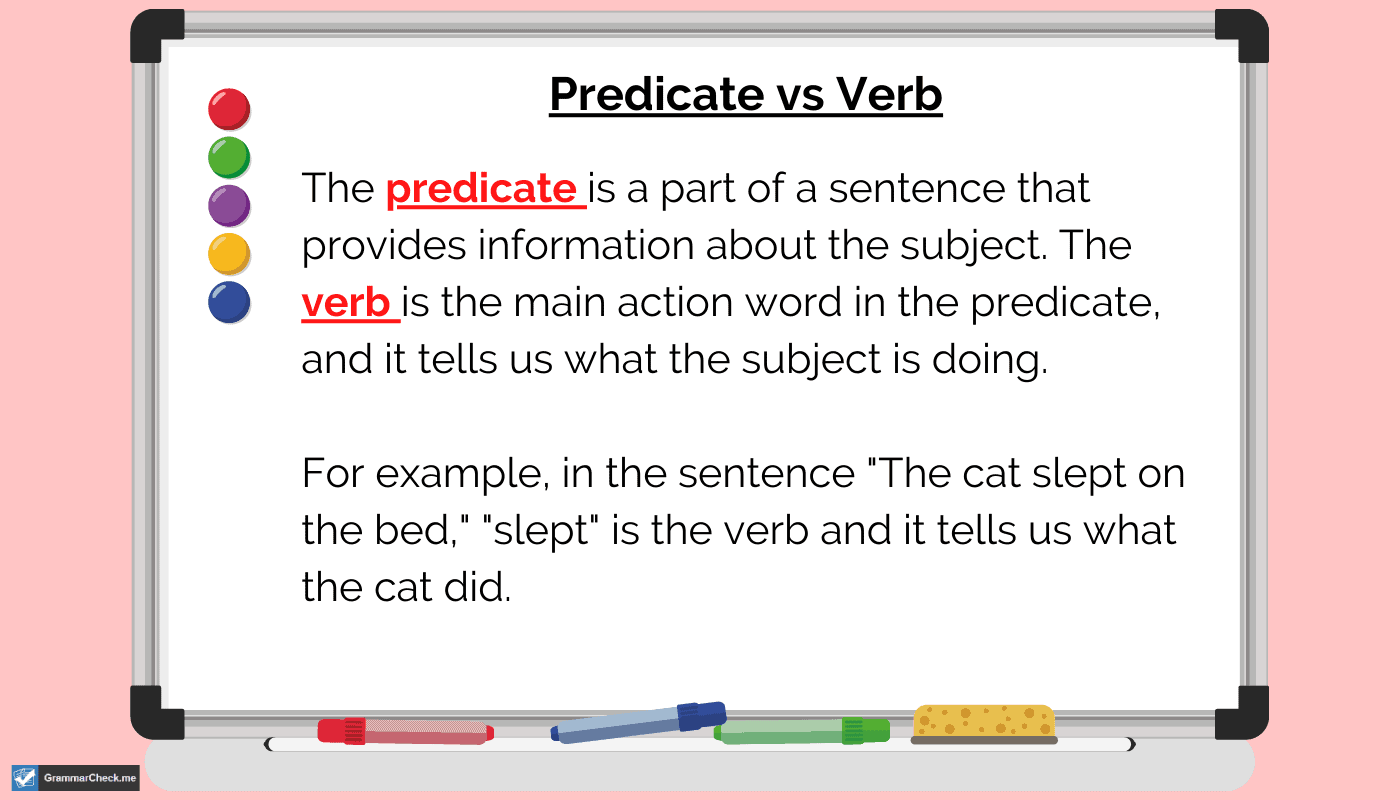Knowing the difference between a predicate vs verb is tricky, but this article makes it simple!

Learning the rules of the modern English language is difficult for many, but this is especially true for non-native English speakers.
A particularly tricky concept of English grammar is predicates, including when to use them and how to differentiate them from simple verbs. If you’re looking for clarity on predicates and verbs, you’ve come to the right place.
Keep reading to learn the difference between a predicate vs verb and learn how to use each in a sentence!
What Is a Verb?
Even if you think you know what a verb is, like the words pedaling or pedalling, it’s always good to get a refresher, especially when discussing verbs in the context of predicates.
There are three main components that make up a sentence:
- The subject
- The verb (
- The complement
A verb is a word that describes an action, occurrence, or state of being. Remember, every sentence needs subject and verb agreement! Generally, a verb phrase indicates whether the main subject performs an action, receives an action, or is in a state of being.
Here are examples of all three uses of verbs:
- Gemma sang for my family: subject performed the action
- Ryan was given a second chance: subject received the action
- Your shoes are in the closet: the subject is in a state of being
There are many types of verbs in English, such as an action verb or linking verb. While different verbs may serve slightly different functions, the overall function of describing an action remains the same. There are even less common verb forms like compound verbs and even vivid verbs that writers use!
Moreover, a verb is the only part of a sentence that is mandatory in English – any sentence without a verb is incomplete.
As a result, some sentences consist of just verbs that can be considered full sentences. Some common examples of this phenomenon include:
- Go!
- Stop!
- Run!
These are referred to as imperative statements, which happen when you request, offer advice, issue a command, or give an instruction. When you say a statement such as go, the subject is implied to be whoever you’re talking to.
It’s important to note that this is only possible with action verbs, not state-of-being verbs. Verbs like are or is are very popular in our daily writing!
Now that you understand what a verb is and how it functions, let’s jump into predicates.

What Is a Predicate?
While a predicate is another crucial part of a sentence, it is in a different category than verbs.
A predicate is the part of the sentence that adds meaning or detail to the subject by modifying it somehow. It specifies what the main subject is or does or tells what is done to the subject.
If this sounds a lot like a verb, you’re on the right track. The predicate always contains a verb describing what the subject in the sentence does. In fact, the simplest form of a predicate is a verb, which we refer to as a “simple predicate.” But when you pair the verb with other words that describe its action, you end up with a complete predicate.
It is also important to know what is a predicate noun in order to take your writing to the next level. There are several different types of predicates!
Complete Predicate
Beyond a verb, a predicate can also include:
- Modifier (words, phrases, and clauses that affect and often enhance the meaning of a sentence)
- Object (noun or pronoun)
- Complement
Here are three examples of sentences with complete predicates, with the predicate in bold:
- She is leaving for the airport in 10 minutes.
- Frankie ate lunch at home this afternoon.
- I remember what I planned on doing today.
These sentences not only contain a verb but have additional descriptions to enhance the verb and the overall sentence, meaning they contain predicate verbs. If I had to give one unique SAT grammar tip, it would be to master complete predicates! Were the sentences to end at the verb, these sentences would be deemed to have simple predicates. Let’s dive deeper into what that means.
Simple Predicate
In English, a complete sentence with as much description as possible is preferred, so you’ll often use complete predicates in your writing.
However, a predicate is a basic part of speech that can be a single word – the simple sentence’s verb. Here are examples of one-word predicates.
- He ran: The simple subject is “he,” and the predicate is “ran.”
- It died: The simple subject is “it,” while the predicate is “died.”
- They lost: The simple subject is “they,” and the predicate is “lost.”
In each example, the verb acts as a simple predicate, and the predicate modifies or describes the subject.

Predicate vs Verb – What Is the Difference?
If you’re still confused by the difference between a predicate vs a verb, that’s perfectly normal. It is easy to confuse the two concepts, as they are closely related. Luckily, to understand predicate vs verb, there are a few tricks that you can use.
Firstly, you can think of a verb as simply an action word and a predicate as a sort of statement – meaning it conveys more than a simple verb can.
An easier way to remember the difference between a predicate vs verb is that everything in a sentence that is not the subject serves as the predicate.
Remember this simple rule: a predicate cannot exist without a verb, and a verb alone can serve as a simple predicate.
Moreover, a sentence’s subject always needs a predicate, and a predicate always needs a subject, but a verb can stand alone.
Final Thoughts
To recap, a verb is an action word, while a predicate is a statement modifying a subject. Beyond that, every sentence has a verb, and a verb can serve as a predicate on its own.
Now that you know predicates and verbs, you’ll be more aware of the meaning of the sentences you form and, as a result, improve your writing and English grammar.
